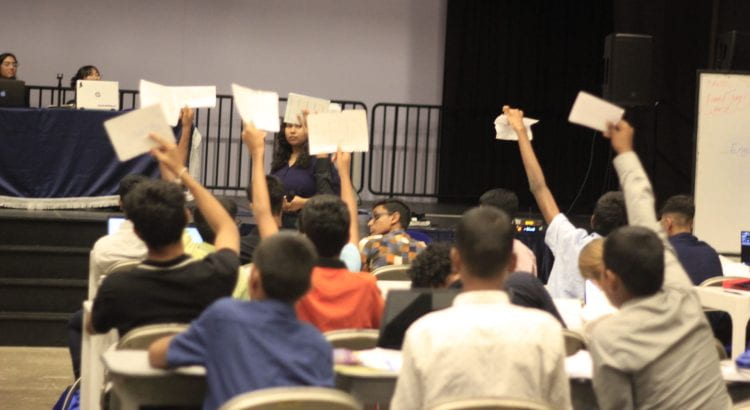Before I go on about what planning anything at OSC is like, here’s a bit of context on what exactly a Practice Debate is. Every year, before we host the final three days of COMUN, we host three practice debates at the Overseas School of Colombo campus to not only prepare delegates for the main conference but also for us, the organisers, to figure out the logistic details of what we need to prepare to ensure the final conference runs seamlessly. The reasons for having these practice debates are numerous since they are opportunities for everyone involved in COMUN to refine their work in time for the conference in some way or another, be it delegates, admins, EXCO members, or the Secretariat. It is a chance to get everything in order before the final conference days arrive. All that being said, these practice debates (PDs) are crucial as they set the tone for the conference and act as the first glimpse of what COMUN XXX has in store for this year.
Planning the PDs was an experience like no other because of everything I was able to learn through the process of organising such an event. At each PD, we were expecting nearly 300 students on campus, breaking out into eight committee rooms for the entire day. Though it may sound simple enough, there are a myriad of logistical, security, and administrative procedures to go through in order to secure an event of this magnitude in our school. Organising and coordinating were two of the most notable and beneficial skills to have in order to pull off these three days. Since the entirety of the conference and everything it entails is fully student-led, my team (the Secretariat & EXCO – a collection of students from other schools and some from OSC) is in charge of putting everything together and negotiating with all the necessary people. For me, as secretary-general, this meant I organised communication between the OSC administrators and security to inform them of what we would require in terms of rooms at the school, equipment, set-up details, etc. Additionally, I oversaw the negotiations and requirements for food since we needed to cater for the 300 people on campus, as well as deal with the chairs of committees to ensure they were on track and ready for delegates. Overall, there are a lot of factors to consider especially when you look at how many people are participating and counting on me to liaise and ensure smooth execution.
Naturally, taking on such a big undertaking was not without its challenges along the way. Luka Traveller, the head of operations for this year’s session, was coordinating a lot of the logistical details with caterers and procurement of certain goods we needed for the practice debates, like official COMUN shirts, while I handled all the OSC set-up coordination. We ran into some obstacles on the first day with parking restrictions at OSC and security, which was hectic, but we were able to come up with solutions at the moment and take them into consideration for the future. A skill that I feel I have significantly honed through this whole process has been dealing with conflict and problem-solving in action. To be able to think of the spot and come up with creative solutions is an expendable skill for anyone to have, something I quickly realised throughout this process. A large sum of my position as SG comes down to coordinating with ‘Faculty Advisors’, who are the teachers from the participating schools. This skill of problem-solving creatively has helped me communicate with the Faculty Advisors as and when they have approached me with anything that requires clarification/rectification.
Another slight, not so slight, obstacle for me during this process was that in between practice debates (which were held nearly a week apart from each other) fell the annual Week Without Walls trip. This no-devices trip that is meant to disconnect students from their work back home ended up falling in between the dates we set for the PDs, making my life oh so easy! Okay, I’m being bitter; it ran pretty smoothly because my teachers were accommodating and let me work from the trip itself, so any damage control to be done was taken care of. This whole experience of organising and coordinating with such a large number of people has taught me how to manage a team, keep my composure in stressful moments, construct creative solutions, and a number of other skills that may sound like me plugging in IB learner profile buzzwords but is entirely true.
Overall, all three PDs ran very smoothly thanks to the tireless work of the team and their cooperation throughout the weeks. Though it meant we had to give up nearly 3 weekends and countless hours of planning, we all formed a major sense of comradery through this experience that would not have been possible otherwise.


